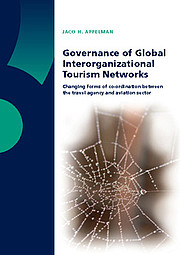Governance of Global Interorganizational Tourism Networks; Changing forms of co-ordination between the travel agency and aviation sector Defended on Friday, 19 March 2004
This thesis has as its object of analysis the co-ordination and evolution of global inter-organizational networks that produce corporeal mobility: the travel agency and aviation sector. These networks are part of one of the largest and oldest global economic sectors, tourism. Contrary to the accepted wisdom that networks are flexible, highly adaptive structures that promote collaboration this inter-organizational network is characterized by a high degree of inertia, high levels of tension and conflict and low levels of collaboration. When researched at the national level the same networks were found to be highly innovative and to create many backward linkages. Answers to these seemingly contradictory observations focus on the way the sectors are embedded in institutional arrangements, the forms of co-ordination that govern the distribution relationship and the characteristics and structure of relationships. Conceptually, elements of a generalized theory of transaction costs are tested. One of the main conclusions is that competence and resource based approaches are mutually supportive and not exclusive in explaining change and inertia.
Keywords
Coordination, Governance, Tourism, Services, Innovations, Travel, Aviation, Relationships, Interorganizational Networks








